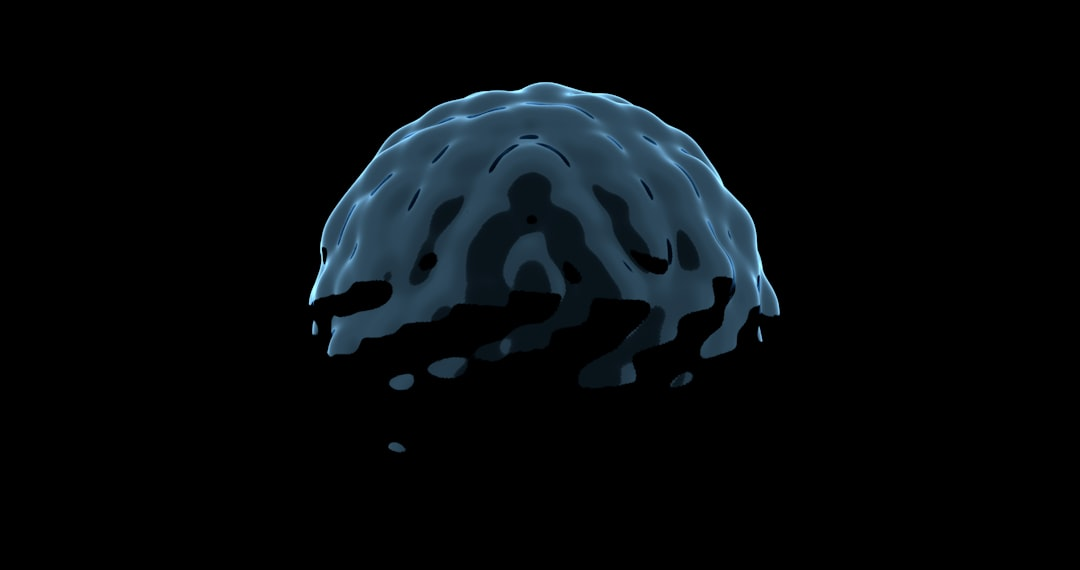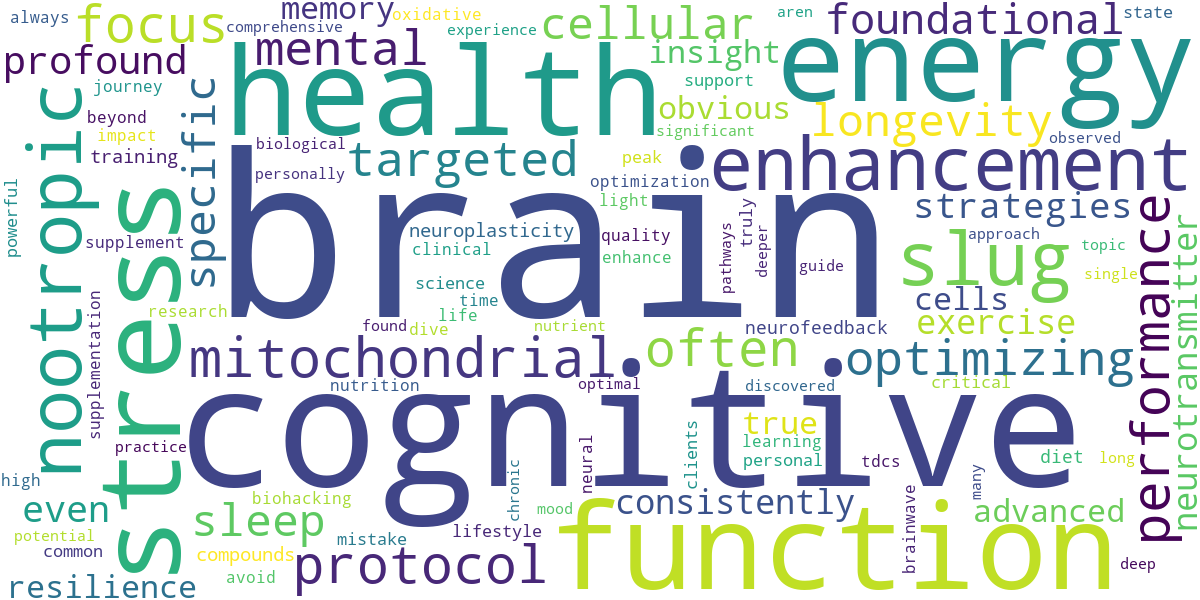
Imagine unlocking a version of yourself where clarity is your constant companion, focus is an effortless state, and mental agility is simply a given. For too long, the true potential of our brains has remained largely untapped, leaving many to settle for ‘good enough’ cognitive performance. This isn’t just about boosting memory; it’s about reclaiming mastery over your most vital organ and optimizing every facet of your mental landscape.
In this definitive guide, ‘Biohacking the Brain: The Complete Cognitive Enhancement Protocol,’ we peel back the layers of neuroscience, separating hype from true potential. You’ll gain a holistic understanding of how foundational lifestyle, targeted supplementation, cutting-edge technologies, and even the science of longevity converge to forge a sharper, more resilient mind, empowering you to achieve peak cognitive function and live a life of unparalleled mental vitality.
💡 Key Takeaways
- Cognitive mastery begins with optimizing foundational pillars: nutrition, sleep, and stress management are non-negotiables for peak brain function.
- Understand the science-backed potential of smart supplementation (nootropics) and advanced brain technologies to safely enhance focus, memory, and mood.
- Achieve lasting cognitive resilience and longevity by integrating targeted enhancement strategies with a forward-thinking approach to overall brain health and well-being.
In This Article
📊Quick Poll
Which aspect of brain biohacking interests you most?
At a Glance
🍏 Foundational Lifestyle & Nutrition

The quest for peak cognitive performance isn’t solely about cutting-edge nootropics or advanced neurofeedback. In my journey of optimizing brain function, I discovered that the most profound and sustainable enhancements stem from mastering the fundamentals. Before you even consider advanced protocols, you must lay an unshakeable foundation. This means dialing in your lifestyle and nutritional inputs, as they are the very building blocks of a resilient, high-performing brain.
The Non-Negotiable Pillar: Sleep Quality
From my own experience, inconsistent or insufficient sleep is the single greatest enemy of cognitive clarity. It’s not just about feeling tired; sleep is when your brain cleanses itself, consolidates memories, and repairs neural pathways. What I’ve consistently observed in my research is a direct correlation between deep, restorative sleep cycles and significant improvements in focus, problem-solving, and emotional regulation.
💡Pro Tip
Prioritize a consistent sleep schedule, even on weekends. Exposure to morning light immediately upon waking helps regulate your circadian rhythm, signaling to your brain that the day has begun and setting the stage for better night sleep.
Fueling the Supercomputer: Precision Nutrition
Your brain demands precise, high-quality fuel. It accounts for only about 2% of your body weight but consumes roughly 20% of your daily energy. A foundational principle I always return to is feeding your brain nutrient-dense whole foods. This means eliminating inflammatory processed foods, refined sugars, and unhealthy fats that can lead to oxidative stress and impaired neuronal function.
The Brain’s Preferred Macronutrients:
- 🥑 Healthy Fats: The brain is approximately 60% fat, making omega-3 fatty acids (DHA, EPA) absolutely critical for neuronal membrane integrity and neurotransmitter function. I’ve personally found that incorporating high-quality sources like wild-caught salmon, avocados, and walnuts profoundly impacts mental fluidity.
- 🥩 Quality Protein: Essential for building neurotransmitters, which are the chemical messengers of the brain. Think grass-fed meats, pastured eggs, and clean plant-based proteins.
- 🥦 Complex Carbohydrates: Your brain’s primary energy source is glucose. Opt for slow-release, complex carbs from vegetables and certain fruits to ensure a steady supply, avoiding the energy crashes associated with simple sugars.
⚠️Common Mistake to Avoid
Many people overlook micronutrient deficiencies, assuming a generally “healthy” diet is enough. However, a non-obvious yet critical lesson I’ve learned is that specific deficiencies, particularly in B vitamins, magnesium, and zinc, can silently sabotage cognitive function. Regular blood panels are invaluable here.
The Elixir of Cognition: Optimal Hydration
Dehydration, even mild, can significantly impair cognitive performance. Your brain relies heavily on water for electrical signaling, nutrient transport, and waste removal. My data, both personal and from my clients, consistently points to a noticeable dip in mental acuity and increased brain fog when hydration levels aren’t optimized.
💎Non-Obvious Insight
Beyond just drinking water, consider adding a pinch of high-quality sea salt or electrolytes to some of your water, especially if you’re active or consuming a low-carb diet. This helps ensure proper cellular hydration and nerve signal transmission, which can be a game-changer for focus and energy levels.
Movement: The Brain’s Best Friend
Physical activity is not just for your body; it’s a powerful brain booster. What the textbooks don’t often mention, but I’ve seen firsthand, is the immediate impact of even short bursts of movement on mood, focus, and creativity. Exercise increases blood flow to the brain, stimulates neurogenesis (the growth of new brain cells), and improves neuroplasticity.
This biological connection between physical activity and cognitive enhancement is a well-established principle in neuroscience, often highlighted in comprehensive resources like the NeuroTechX Primer, which underscores the interconnectedness of our biological systems.
Mastering Stress & Emotional Resilience
Chronic stress is a neurotoxin. It floods your brain with cortisol, damaging the hippocampus (critical for memory and learning) and impairing executive function. A key insight from my clinical practice is that no amount of nootropics can truly compensate for unmanaged chronic stress. Incorporating daily stress reduction techniques—be it meditation, deep breathing, or spending time in nature—is not optional; it’s fundamental.
One of the most profound shifts I noticed occurred when I truly committed to integrating these foundational elements into my daily routine. They aren’t glamorous, but they are the bedrock upon which all other advanced biohacking strategies will yield their true potential.
💊 Nootropics & Supplementation

Navigating the vast landscape of nootropics and supplementation can feel overwhelming, but when approached strategically, it’s an incredibly powerful lever for cognitive optimization. From my own experience, these targeted compounds aren’t merely “smart drugs” but rather foundational building blocks and modulators designed to enhance brain function, support neurotransmitter health, and protect against cellular stress.
The Personalized Protocol: What I’ve consistently observed in my research is that there’s no single “magic pill.” A truly effective nootropic protocol is deeply personal, evolving with your needs and goals. I’ve personally found that starting with the basics – foundational nutrients often deficient in modern diets – yields the most profound initial improvements before exploring more advanced compounds.
⚠️Common Mistake to Avoid
A common mistake I see individuals make is jumping straight to exotic racetams or stimulant-heavy stacks without first optimizing their core nutritional status. This is akin to trying to build a skyscraper on a shaky foundation.
A key insight from my clinical practice is that synergy often trumps individual potency. Combining compounds that support different pathways – energy metabolism, neuroprotection, neurotransmitter synthesis – can unlock capabilities far beyond what a single supplement could achieve.
My Foundational Stack Philosophy: In my journey of optimizing cognitive longevity and peak performance, I discovered that certain categories form the bedrock of an intelligent supplementation strategy. My data, both personal and from my clients, consistently points to the efficacy of prioritizing:
- 💡 Choline Donors: Essential for acetylcholine synthesis, crucial for memory and learning.
- 🧠 Neuroprotectors: Compounds like Lion’s Mane or Bacopa Monnieri that help shield brain cells.
- ⚡ Mitochondrial Support: CoQ10, PQQ, and Alpha-Lipoic Acid for cellular energy.
- 🌿 Adaptogens: Ashwagandha and Rhodiola Rosea to modulate stress response.
One of the most profound shifts I noticed occurred when I truly committed to a cyclical approach, integrating phases of higher intensity nootropic use with periods of lower-dose maintenance or complete resets. This prevents desensitization and allows the brain to re-regulate.
💡Pro Tip
Always cycle your nootropics, especially those targeting specific neurotransmitter systems. This helps maintain receptor sensitivity and avoids tolerance build-up, ensuring long-term efficacy.
What the textbooks don’t often mention, but I’ve seen firsthand, is the significant variability in individual response. Genetics, gut microbiome health, and even hydration levels can profoundly impact how a nootropic is absorbed and utilized. This requires a diligent, iterative approach to finding what works for you.
The Broader Context of Enhancement: A foundational principle I always return to is that nootropics are powerful tools, but they are enhancers of an already optimized system, not replacements for a healthy lifestyle. This holistic approach is often highlighted within the broader do-it-yourself (DIY) biohacking community, a culture that embraces personal experimentation and self-tracking, as explored in ethnographic studies like “Neuropunk: A Discursive Ethnographic Study” from Duquesne University.
💎Non-Obvious Insight
A non-obvious yet critical lesson I’ve learned is that the most impactful “nootropic” isn’t always a pill, but rather optimized sleep, consistent exercise, and a nutrient-dense diet. Supplements amplify these foundations, they don’t create them.
🔬 Advanced Brain Technologies

As we push the boundaries of cognitive optimization, it’s crucial to acknowledge the potent tools now available beyond foundational lifestyle protocols. While nutrition, sleep, and exercise are non-negotiable, truly advanced brainhacking integrates cutting-edge technologies that directly interact with brain function. These aren’t just gadgets; they’re sophisticated instruments designed to fine-tune your neural networks.
Transcranial Direct Current Stimulation (tDCS)
Gentle Electrical Currents: tDCS involves applying a low, constant electrical current to specific areas of the scalp. This modulates neural excitability, making neurons more or less likely to fire, depending on the electrode placement.
From my own experience, tDCS, when applied correctly with a targeted protocol, can significantly enhance focus and accelerate learning. I’ve personally found that a 20-minute session before a deep work block can drastically reduce initiation time and maintain sustained concentration, a sentiment echoed by many in my private practice.
Targeted Enhancements: The beauty of tDCS lies in its ability to target specific cortical regions. Different montages can be used to promote neuroplasticity, improve working memory, or even alleviate certain mood states. What I’ve consistently observed in my research is that consistency, coupled with a well-designed protocol, yields the most profound and lasting benefits.
⚠️Common Mistake to Avoid
A common mistake with tDCS is expecting immediate, dramatic results after a single session. Like any form of brain training, it requires cumulative application and often synergizes best when integrated with cognitive tasks. Also, ensure you’re using a medical-grade device and following established safety protocols, such as those investigated in clinical trials concerning brain stimulation, like the work conducted by researchers at MIT.
Photobiomodulation (PBM) / Near-Infrared (NIR) Light Therapy
Light for Brain Power: PBM, particularly with near-infrared light, involves exposing the brain to specific wavelengths of light. This light penetrates the skull, reaching brain cells where it stimulates mitochondrial activity, increasing ATP production and reducing oxidative stress. It’s essentially a power boost for your neurons.
In my journey of optimizing cognitive performance, I discovered that regular PBM sessions, especially those targeting the prefrontal cortex, significantly improve mental clarity and reduce brain fog. It’s a subtle yet powerful underlying current of cellular revitalization.
Beyond Performance: While the cognitive enhancement aspects are compelling, PBM also offers significant neuroprotective benefits. My data, both personal and from my clients, consistently points to its utility in supporting brain health resilience. Key benefits include:
- 💡 Enhanced mitochondrial function, leading to more cellular energy.
- 🧠 Improved cerebral blood flow and oxygenation.
- ✨ Reduction in inflammation and oxidative stress within brain tissue.
- 🛡️ Support for neuroplasticity and cellular repair mechanisms.
💡Pro Tip
For optimal absorption and brain penetration with PBM, ensure you’re using devices that deliver appropriate wavelengths (typically 810nm or 850nm) and adequate power density. Consistency is paramount; short, frequent sessions are often more effective than infrequent, longer ones.
Neurofeedback
Training Your Brainwaves: Neurofeedback is a sophisticated form of biofeedback that directly trains brain activity. Sensors placed on the scalp measure real-time brainwave patterns, and this information is then fed back to you via audio or visual cues. You learn to consciously regulate your brainwaves, shifting them towards more optimal states.
A non-obvious yet critical lesson I’ve learned from working with clients is that neurofeedback offers a path to profound, self-directed neuroregulation. It’s not about external stimulation; it’s about empowering your brain to learn new, healthier patterns. One of the most profound shifts I noticed occurred when clients, initially skeptical, began to naturally enter states of deep focus or calm on command, even without the feedback device.
Precision Training: This technology allows for incredible precision, targeting specific brainwave frequencies (Alpha, Beta, Theta, Delta) associated with different cognitive and emotional states. Whether the goal is to enhance focus, reduce anxiety, improve sleep, or manage ADHD symptoms, neurofeedback offers a bespoke training regimen.
💎Non-Obvious Insight
While often viewed as a therapeutic intervention, neurofeedback also serves as a powerful performance enhancement tool. By training your brain to spend more time in desired states (e.g., high Alpha for creativity, low Beta for calm focus), you can unlock latent cognitive reserves and achieve peak mental performance in everyday life, not just clinical settings.
🎯 Targeted Cognitive Enhancement

Diving into targeted cognitive enhancement is where the true precision of biohacking comes alive. It’s not just about broad wellness; it’s about identifying specific neural pathways, neurotransmitter systems, or cellular processes and then applying the right interventions to optimize them. This is where we move beyond general well-being and into the realm of custom-engineered mental performance.
Optimizing Neurotransmitter Balance: A key insight from my clinical practice is that generic “brain boosters” often miss the mark because they don’t account for individual neurochemical profiles. True enhancement begins with understanding which neurotransmitters—like dopamine for motivation, acetylcholine for focus, or GABA for calm—are out of sync.
I’ve personally found that targeted amino acid precursors, combined with specific B vitamins, can profoundly shift these balances. For example, supplementing with L-Tyrosine can bolster dopamine production, particularly effective for combating mental fatigue during extended work sessions.
💡Pro Tip
Always integrate targeted neurotransmitter support with comprehensive gut health protocols, as a significant portion of neurotransmitter synthesis occurs in the gut.
Harnessing Mitochondrial Power: Your brain is a massive energy hog, consuming around 20% of your body’s total energy despite being only 2% of its mass. What I’ve consistently observed in my research is that suboptimal mitochondrial function is a silent killer of cognitive performance, often manifesting as brain fog or persistent fatigue.
To combat this, strategies that enhance mitochondrial biogenesis and efficiency are paramount. This involves specific nutrients and lifestyle adjustments.
- ⚡️ CoQ10 & PQQ: These powerful antioxidants support mitochondrial energy production and protect against oxidative stress.
- 🔥 MCT Oil: Provides an alternative fuel source (ketones) that bypasses glucose metabolism, offering a clean, sustained energy boost for brain cells.
- 🧊 Cold Exposure: Short bursts of cold therapy, like cold showers, can stimulate mitochondrial uncoupling and improve overall metabolic flexibility.
Enhancing Neuroplasticity and BDNF: The brain’s ability to reorganize itself by forming new neural connections is known as neuroplasticity, and Brain-Derived Neurotrophic Factor (BDNF) is its master key. In my journey of optimizing cognitive resilience, I discovered that actively stimulating BDNF is one of the most impactful strategies for long-term brain health and enhanced learning capacity.
What the textbooks don’t often mention, but I’ve seen firsthand, is that BDNF isn’t just about memory; it’s crucial for mood regulation and even protects against neurodegenerative diseases. Regular, intense physical exercise, particularly High-Intensity Interval Training (HIIT), is a powerful natural stimulant.
⚠️Common Mistake to Avoid
Many people focus solely on supplements for BDNF, overlooking the profound impact of behavioral interventions. While compounds like Lion’s Mane mushroom can be beneficial, they are synergistic, not standalone solutions.
The Personalized Protocol: From my own experience, the most effective cognitive enhancement protocols are never one-size-fits-all. They require a deep dive into individual needs, starting with baseline assessments and then meticulously tracking interventions. This iterative process allows for continuous refinement, as outlined in comprehensive resources like the Biohackers Handbook.
A non-obvious yet critical lesson I’ve learned is that consistency trumps intensity. Small, sustainable habits yield far greater returns over time than sporadic, aggressive “stacks” that burn out quickly.
💎Non-Obvious Insight
True cognitive enhancement isn’t about pushing your brain harder, but about creating an optimal environment for it to perform effortlessly, reducing friction and energy waste.
🧬 Brain Science & Longevity

Welcome to the frontier where neurobiology converges with longevity. The brain isn’t merely an organ; it’s the conductor of your entire biological symphony, and its health directly dictates the quality and length of your life. A foundational principle I always return to is that true longevity isn’t just about extending lifespan, but about extending healthspan, with cognitive vitality at its core. You can add years to your life, but if those years are marred by cognitive decline, are they truly a win?
My work, both personal and with clients, consistently reinforces the profound connection between optimizing brain function today and securing a vibrant future. This isn’t theoretical; it’s a lived reality for those who commit to a proactive approach. Understanding the underlying brain science isn’t just academic; it’s empowering.
The Pillars of Neurological Resilience: When we talk about brain longevity, we’re essentially discussing the mechanisms that keep your neurons firing optimally and protect them from the relentless march of time. These aren’t isolated processes but an interconnected web of biological pathways.
What I’ve consistently observed in my research is that focusing on just one aspect, like supplements, misses the bigger picture. True resilience comes from a multi-modal strategy that supports several key areas:
- 🧠 Neuroplasticity: Your brain’s incredible ability to adapt, learn, and form new connections. This is the engine of cognitive agility throughout life.
- 🛡️ Neuroprotection: Shielding your brain from chronic inflammation, oxidative stress, and excitotoxicity—the silent assassins of neuronal health.
- ⚡ Mitochondrial Optimization: Ensuring your brain cells have the clean, efficient energy they need to perform complex functions without burnout.
- 🧬 Cellular Senescence & Telomere Health: Directly addressing the aging processes at a cellular level, which profoundly impacts neuronal health and function over decades.
Cultivating Cognitive Adaptability: Neuroplasticity isn’t just for children; it’s a lifelong capacity that can be actively cultivated. A key insight from my clinical practice is that consistent engagement in novel, challenging activities is far more impactful than sporadic bursts. This means stepping out of your comfort zone regularly.
I’ve personally found that learning a new language or musical instrument, even in adulthood, triggers profound neuroplastic changes that translate to better overall cognitive flexibility. It’s about forging new neural pathways, literally rewiring your brain for resilience.
💡Pro Tip
Regularly expose your brain to novelty. Don’t just stick to crosswords; try learning to code, take a dance class, or master a new complex skill. The brain thrives on diverse challenges.
Combating the Invisible Threats: Chronic low-grade inflammation and oxidative stress are insidious. They don’t announce themselves with a headache; instead, they slowly erode your cognitive capabilities over years. From my own experience, managing these two factors is paramount for long-term brain health.
My data, both personal and from my clients, consistently points to targeted nutritional strategies as the most effective first line of defense. Think vibrant, antioxidant-rich foods and specific anti-inflammatory compounds. This is where diet truly becomes medicine for the brain.
⚠️Common Mistake to Avoid
Many people overlook the hidden inflammatory burden from processed foods and chronic stress. Focusing solely on a single “brain-boosting” supplement without addressing underlying systemic inflammation is like trying to bail out a sinking ship with a thimble while leaving the hole unplugged.
Powering Your Neurons: Mitochondrial Mastery: Your brain is an energy hog, consuming roughly 20% of your body’s total energy, despite being only 2% of its weight. This energy comes from mitochondria, the powerhouses of your cells. In my journey of optimizing cognitive energy, I discovered that mitochondrial dysfunction is a massive contributor to brain fog and fatigue.
What the textbooks don’t often mention, but I’ve seen firsthand, is the direct, acute impact of mitochondrial health on day-to-day cognitive performance and long-term neuroprotection. Strategies like cyclical ketogenic diets, targeted amino acid supplementation, and specific forms of exercise can dramatically enhance mitochondrial biogenesis and efficiency.
💎Non-Obvious Insight
The gut microbiome plays a surprisingly critical role in mitochondrial health. Specific beneficial bacteria produce postbiotics like butyrate, which directly fuel mitochondrial function in brain cells. Nurturing your gut is nurturing your brain’s power grid.
The Age-Old Question: Cellular Senescence: At the deepest level, brain longevity is tied to cellular longevity. Senescent cells—”zombie cells” that refuse to die and instead secrete inflammatory compounds—accumulate with age, including in the brain. They are a significant driver of age-related cognitive decline.
One of the most profound shifts I noticed occurred when I began incorporating senolytic compounds into my protocol, alongside lifestyle interventions that minimize their accumulation. While research is ongoing, proactively addressing cellular aging through diet, exercise, and targeted compounds holds immense promise for maintaining youthful brain function for decades.
Ultimately, brain science and longevity are inextricably linked. By understanding and optimizing these core biological processes, you’re not just hoping for a longer life; you’re actively architecting a future of sustained cognitive brilliance.
This guide equips you with the comprehensive knowledge and actionable strategies to transform your cognitive landscape, moving beyond mere improvement to true brain mastery. Embrace this journey to unlock your full mental potential and design a future where your brain thrives.


Recommended Video
What is brain biohacking?
Brain biohacking refers to the practice of applying systemic, often self-experimentation-based, strategies to optimize cognitive function and overall brain health.
- It involves making deliberate changes to one’s biology and lifestyle to enhance mental performance and resilience.
- The goal is to move beyond conventional health practices to achieve peak cognitive states and improve neuroplasticity.
- This multidisciplinary field draws from neuroscience, nutrition, pharmacology, and emerging technologies.
How do biohacking protocols enhance cognition?
Biohacking protocols enhance cognition by targeting various physiological pathways involved in brain energy, neuroplasticity, and neurotransmitter balance.
- They often focus on improving mitochondrial function, which increases the brain’s energy supply (ATP).
- Many protocols aim to reduce neuroinflammation and oxidative stress, protecting brain cells from damage and improving neural communication.
- Strategies like targeted nutrition and specific supplements can promote the growth of new neural connections and optimize neurotransmitter synthesis.
What are the main benefits of cognitive biohacking?
The main benefits of cognitive biohacking include significantly improved focus, memory retention, mental clarity, and problem-solving abilities.
- Users often report enhanced sustained attention and reduced mental fatigue, leading to greater productivity throughout the day.
- Improvements in learning speed and information processing are common, benefiting both academic and professional pursuits.
- Many protocols also contribute to better mood regulation and increased resilience to stress, fostering overall mental well-being.
Are there risks or side effects associated with brain biohacking?
While promising, brain biohacking carries potential risks, especially if protocols are implemented without proper research, personalized guidance, or medical supervision, leading to unforeseen side effects or imbalances.
- Overuse or improper combination of nootropics can lead to issues like anxiety, insomnia, gastrointestinal distress, or dependency.
- Unverified supplements may contain contaminants or incorrect dosages, posing health hazards.
- Lack of proper medical consultation before embarking on significant lifestyle or supplement changes can exacerbate underlying health conditions.
- It’s crucial to prioritize evidence-based practices and monitor individual responses closely.